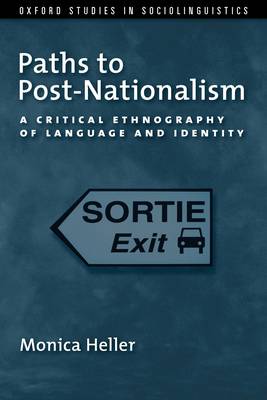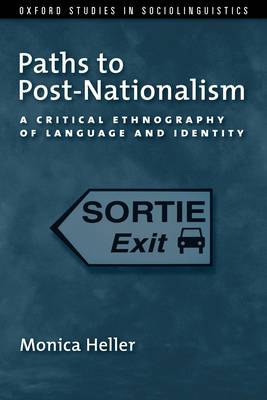
Onze Vivlio e-readers ondervinden momenteel synchronisatieproblemen. We doen er alles aan om dit zo snel mogelijk op te lossen. Onze excuses voor het ongemak!
- Afhalen na 1 uur in een winkel met voorraad
- Gratis thuislevering in België vanaf € 30
- Ruim aanbod met 7 miljoen producten
Onze Vivlio e-readers ondervinden momenteel synchronisatieproblemen. We doen er alles aan om dit zo snel mogelijk op te lossen. Onze excuses voor het ongemak!
- Afhalen na 1 uur in een winkel met voorraad
- Gratis thuislevering in België vanaf € 30
- Ruim aanbod met 7 miljoen producten
Zoeken
€ 65,95
+ 131 punten
Uitvoering
Omschrijving
Nationalism informs our ideas about language, culture, identity, nation, and State--ideas that are being challenged by globalization and an emerging new economy. As language, culture, and identity are commodified, multilingualism becomes a factor in the mobility of people, ideas and goods--and in their value. In Paths to Post-Nationalism, Monica Heller shows how hegemonic discourses of language, identity, and the nation-State are destabilized under new political and economic conditions. These processes, she argues, put us on the path to post-nationalism. Applying a fine-grained ethnographic analysis to the notion of "francophone Canada" from the 1970s to the present, Heller examines sociolinguistic practices in workplaces, schools, community associations, NGOs, State agencies, and sites of tourism and performance across francophone North America and Europe. Her work shows how the tensions of late modernity produce competing visions of social organization and competing sources of legitimacy in attempts to re-imagine--or resist re-imagining--who we are.
Specificaties
Betrokkenen
- Auteur(s):
- Uitgeverij:
Inhoud
- Aantal bladzijden:
- 240
- Taal:
- Engels
- Reeks:
Eigenschappen
- Productcode (EAN):
- 9780199746859
- Verschijningsdatum:
- 7/01/2011
- Uitvoering:
- Paperback
- Formaat:
- Trade paperback (VS)
- Afmetingen:
- 155 mm x 229 mm
- Gewicht:
- 317 g

Alleen bij Standaard Boekhandel
+ 131 punten op je klantenkaart van Standaard Boekhandel
Beoordelingen
We publiceren alleen reviews die voldoen aan de voorwaarden voor reviews. Bekijk onze voorwaarden voor reviews.











